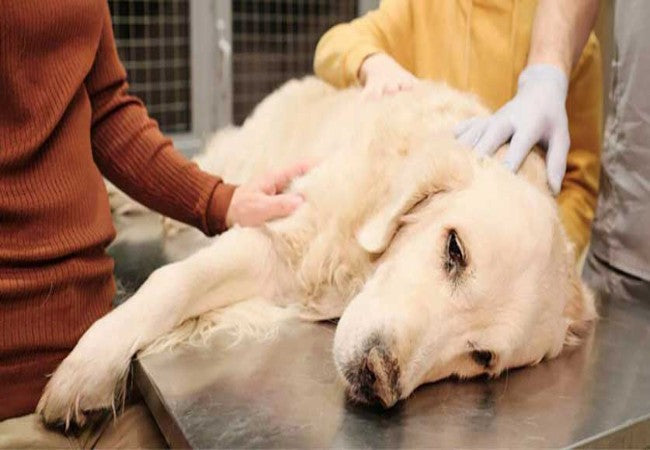Veterinary Guide to Canine Inflammatory Bowel Disease 2025 🩺🐶

In this article
Veterinary Guide to Canine Inflammatory Bowel Disease 2025 🩺🐶
By Dr. Duncan Houston BVSc
🧬 What Is IBD?
Inflammatory Bowel Disease (IBD) in dogs isn’t a single illness, but a syndrome characterized by chronic inflammation of the gastrointestinal tract. This persistent inflammation leads to pain, reduced absorption, diarrhea, vomiting, and weight loss over weeks to months.
👥 Who Is Affected?
- Middle-aged to older dogs, but it can affect any age.
- Breeds predisposed: German Shepherds, Yorkshire Terriers, Boxers, Shar‑Peis, Irish Setters, Rottweilers, Wheaten Terriers, Bulldogs.
👀 Signs & Symptoms
- Chronic or intermittent vomiting and diarrhea (small or large bowel).
- Poor appetite or increased appetite with weight loss.
- Flatulence, borborygmi (“gurgling sounds”), melena, or mucus in stool.
- Dehydration, anemia, abdominal discomfort, and edema in severe cases due to protein loss.
🔍 Underlying Causes
IBD typically arises from:
- Food sensitivities or intolerances (novel or common protein allergens).
- Gastrointestinal bacterial imbalance (dysbiosis) or chronic infection/parasites (e.g., Giardia).
- Immune-mediated reactions—overactivity causing damage.
- Genetic predisposition is seen in certain breeds.
- Associated conditions: exocrine pancreatic insufficiency, lymphangiectasia, Addison’s disease—all must be ruled out.
🔬 Diagnosis Pathway
- History & physical exam: chronic GI signs and breed risk.
- Laboratory work: CBC, chemistry, albumin/protein, cobalamin/folate, fecal parasite tests.
- Imaging: Abdominal ultrasound or X‑rays to rule out obstruction, tumors, and pancreatitis.
- Diet and antibiotic trials: initial non-invasive therapy using hydrolyzed/novel protein diets and empiric antibiotics like tylosin or metronidazole for 2–4 weeks.
- Endoscopy or surgical biopsy: Gold standard for confirmation. Biopsy type (lymphoplasmacytic, eosinophilic, granulomatous) guides therapy.
🛠️ Treatment Strategies
🥗 Diet Management
- Start with hydrolyzed protein or novel protein diets, highly digestible, low‑fat.
- Supplement B12 (cobalamin) if deficient; vital for recovery.
- Introduce prebiotics/probiotics and omega‑3 fatty acids to support gut microbiome and reduce inflammation.
💊 Medications
- Corticosteroids: prednisone or budesonide to reduce immune-mediated inflammation.
- Immunosuppressants (azathioprine, chlorambucil) if steroids alone are insufficient.
- Antibiotics (e.g., metronidazole, tylosin) for bacterial overgrowth or infection.
💧 Supportive Care
- Fluid therapy to correct dehydration, correct electrolytes.
- Anti-nausea medications if vomiting persists.
- Manage any underlying issues (e.g., deworming, Addison’s, pancreatitis).
📈 Monitoring & Long-Term Management
- Re-evaluate clinical signs, weight, and lab values every 4–8 weeks initially, then as needed.
- Taper medication slowly when symptoms stabilize; some maintain remission on low-dose steroids only.
- Maintaining a diet and periodic B12 supplementation are recommended.
🏡 Owner & Lifestyle Tips
- Serve measured meals of prescribed therapeutic diets—avoid treats with novel proteins.
- Monitor stool frequency/quality and vomit patterns; record any changes.
- Maintain hydration and gentle exercise to reduce stress on the gut.
- Communicate with your vet before changing diet or meds.
📱 Ask A Vet Telehealth Integration
- Virtual health checks: Owners can send stool photos, symptom progression, and weight logs for remote assessment.
- Medication & diet reminders: Scheduled alerts for meds, B12, special diets.
- Follow-up prompts: Timed alerts for lab rechecks and tapering plans.
🎓 Case Spotlight: “Gus” the German Shepherd
Gus, a 5-year-old German Shepherd, had chronic loose stool and intermittent vomiting for months. Bloodwork showed low B12 and mild anemia. He started a salmon-based novel protein diet, metronidazole, and probiotic supplementation. At 3 weeks, his stool normalized. Steroid taper began at week 6. Over 12 months, Gus remained symptom-free with diet & probiotic maintenance, supported by Ask A Vet’s remote weight tracking and timely reminders. 🐕😊
🔚 Key Takeaways
- IBD is a chronic GI inflammation syndrome—requires multimodal management.
- Symptoms include chronic diarrhea, vomiting, weight loss, and appetite changes.
- Diagnosis relies on ruling out other causes, followed by diet trials and biopsy.
- Diet, steroids, antibiotics & supplements are often used in combination.
- Long-term care and monitoring, supported with Ask A Vet’s telehealth tools, help dogs thrive. 🐾📲
Dr Duncan Houston BVSc, founder of Ask A Vet. Download the Ask A Vet app today for personalized remote care for GI conditions—including diet support, symptom tracking, and medication reminders—to support your dog’s digestive health every step of the way! 🐶❤️






